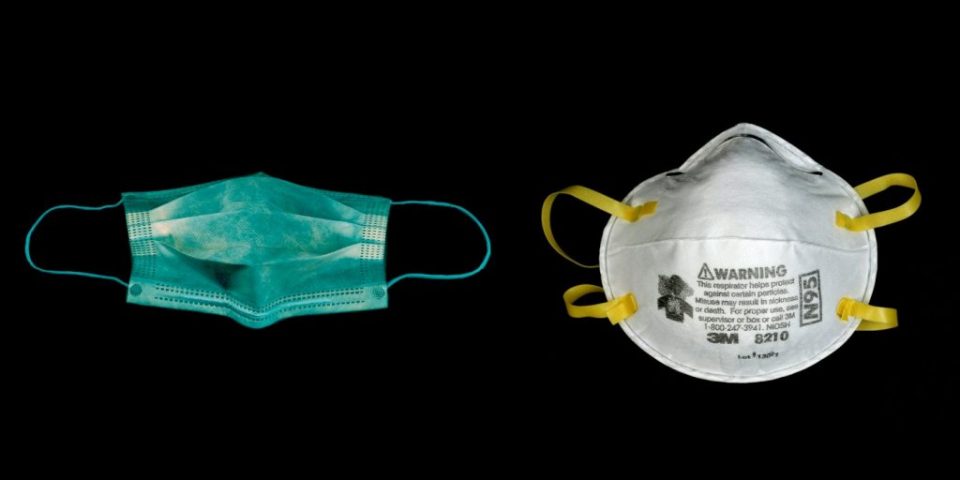From people discarding plastic gloves and masks in cities across the world to important regulations on the use of plastic being scrapped, rolled back or delayed, the problem has taken a back seat during one of the most significant public health crises of modern times.
Surgical masks, gloves, protective equipment, body bags — the Covid-19 crisis has spurred a rapid expansion in the production of desperately-needed plastic products, with governments racing to boost their stockpiles and regular citizens clamoring for their share of supplies. Such production is necessary. But all that plastic ends up somewhere — and environmental campaigners fear it is just the tip of a looming iceberg, with the pandemic causing a number of serious challenges to their efforts to reduce plastic pollution.
PPE adding to oceans’ plastic burden
The coronavirus crisis has sparked a personal protective equipment (PPE) arms race around the world as governments rush to stockpile masks, gloves, visors and gowns. The battle has proven so intense that some have resorted to international mudslinging.
PPE has become an additional threat to the world’s oceans, which have been choking under the weight of plastic at a rapidly increasing rate.

Global plastic production has quadrupled over the past four decades, a 2019 study found, with its authors warning that if that trend continues, the making of plastics will make up 15% of greenhouse gas emissions by 2050. By comparison, all of the world’s forms of transportation now account for 15% of emissions.

Over time, those products break down and add to the vast collections of microplastics in our seas, air and food. And the irony is that, while we produce and discard plastic to fight one public health crisis, we may be slowly contributing to another. The risks of microplastics to human health are still being studied. One stems from the fact that microplastics passing through wastewater plants can pick up harmful bacteria, which they can carry with them. If we ingest the plastics, we may ingest the bacteria. Another is that plastics have a number of chemicals added at the manufacturing stage, and it’s possible that these are released in the body.
Expressing concerns over the rising plastic waste and the pandemic hampering efforts towards fighting the issue, experts say that, people should rethink their reliance on single-use plastic including single-use masks and gloves.

The United Nations has called on countries to treat waste management as “urgent and essential” to combat Covid-19 and prevent knock-on effects on public health and the environment. India generates about 550.9 tonnes of biomedical waste every day as per the data published in ‘Unearthing the Growth Curve and Necessities of Bio-Medical Waste Management in India, 2018’. Experts assert that post-pandemic, the quantity will increase exponentially.

“The outbreak has resulted in a unique scenario, wherein PPEs that were hitherto being used only by highly specialized laboratories, have now come into common use inside hospitals. And because they are by nature created for professionals treating infectious diseases, reuse is not an option,” says Dr. Vijay Habbu, adjunct professor, Institute of Chemical Technology.
Hemp industry in India offers sustainable solutions during crisis
As more and more people incorporate face masks into their outdoor attire, local designers are adding them to their range for the first time.
Here are 3 Indian companies now making face masks:

Based in Rajasthan, Hempstrol not only focuses towards Hemp mask but also Hemp derived Menstrual Cramp Oil. With initiatives like Be a Good Women, Every bottle you purchase will contribute a packet of 5 sanitary napkins in the rural parts of the country where awareness about menstrual hygiene is needed the most.

An organic, sustainable and a top-notch brand of attire for women who love to include an assortment as far as fit, looks, feel and hues. Foxxy a.k.a World of Foxxy is environmentally responsible as well as consciously fashionable, producing and encouraging handloom fabrics. With recent pandemic, designers/manufacturers have brainstormed to create a Face Mask which could help prevent covid-19 and being environmentally responsible. The mask is available both children and adult.

Co-Founder – Karan Sarsar, an engineer who sees enormous potential in Hemp. In 2016 along with engineering students they build the concept and design of a High Performance Exhaust Muffler that would help reduce the carbon emissions from a two-wheeler vehicle to zero.
Along with Exhaust Muffler, Awega Green Technologies expertise in Hemp Bags and of course Hemp Face Mask.
Why You Should Be Wearing A Hemp Face Mask
The novel coronavirus (COVID-19) pandemic has caused a major shortage in medical grade protective face masks for those who really need them, front-line health care workers.
It is suggested that the general population wear non-medical grade cloth masks. It is reported that just by simply wearing a face mask, you are less likely to touch your face. A simple face covering may potentially help to prevent the spread of the virus with asymptomatic people who unknowingly have it. It may reduce the number of droplets getting into the air from sneezing, coughing or simply talking. These masks are not meant to replace the N95 masks. Of course, handwashing, not touching your face and social distancing are of utmost importance.
Now on to why a hemp mask should be your number one choice.
- Hemp material is antimicrobial, naturally resistant to mold and mildew. Especially important when wearing something covering your nose and mouth.
- Hemp fabric is odor resistant. Again, especially important when you are wearing something covering your mouth and nose!
- Hemp becomes softer with each wear. Very important if you are going to be wearing your mask for hours at a time. You will be more likely to wear your mask if it is super comfortable and not causing abrasion to your delicate facial skin.
- Hemp fabric is breathable and moisture-wicking. Masks made from synthetic material will not allow your face to breathe causing uncomfortable sweating. Hemp fabric adjusts to the temperature of your body (or in this case, face) and will keep you fresh and dry.
- Hemp fabric is strong. You can wash your face mask repeatedly and it will maintain its shape and structure. You will have it for as long as you need it.
- Hemp fabric is biodegradable. Disposable face masks are made from a synthetic material that is not biodegradable. Imagine the amount of waste that will be produced from the disposal of these masks worldwide? When we are told that face masks are no longer necessary, you can feel good in knowing that your hemp mask will biodegrade and not clog landfills for years and years.






